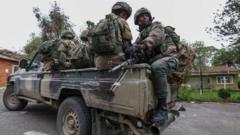Amidst heavy casualties, a long-awaited ceasefire between Israel and Hamas is set to commence, sparking mixed emotions among affected communities. The humanitarian impact of the conflict remains severe, with both sides facing immense losses, and the broader implications on regional stability still uncertain.
Ceasefire Announced Amid Ongoing Tragedy in Gaza

Ceasefire Announced Amid Ongoing Tragedy in Gaza
A new ceasefire agreement between Israel and Hamas raises hopes but fails to resolve the entrenched conflict, as casualties continue to mount.
As the world watches, a significant ceasefire agreement has been announced between Israel and Hamas, expected to take effect soon, but not without deep scars of ongoing violence. Following a war that erupted after Hamas’s attacks on Israel on October 7, 2023, the ceasefire, long anticipated, still feels bittersweet to many. A senior Palestinian official confirmed that Hamas plans to release three female soldiers on the first day of the ceasefire as a gesture of goodwill.
Currently, mediators in Doha are pushing to implement the ceasefire earlier than scheduled, with hopes for its initiation on Thursday evening. The continual violence and tragedy have claimed the lives of at least 12 Palestinians in northern Gaza, where the horrific aftermath of the conflict is evident as bodies are transported from ambulances to mortuaries. Over the past 15 months, this grim scene has evolved into a harsh reality, highlighting the deep human suffering caused by the hostilities.
Despite the announcement, the ceasefire reflects a significant but overdue diplomatic breakthrough. Variations of the deal have been deliberated since a similar initiative was first introduced by US President Joe Biden in May last year. Both Hamas and Israel have cast blame on each other for the extensive delays.
In Gaza’s Khan Younis, reactions to the ceasefire were visible as Palestinians celebrated, dancing, and chanting, albeit within the restricted access of the region where international journalists face prohibitive barriers. The coverage of the conflict has relied heavily on local journalists, who have bravely reported under dire conditions, as more than 200 journalists have lost their lives in Gaza during the ongoing violence.
Umm Muhammad, an elderly Palestinian, expressed a mixture of hope and sorrow in an interview: “The pain has disappeared a bit, though it’s still there. Hopefully, it will be overcome by joy. Let our prisoners get freed and the injured get treated. People are exhausted.” Yet, despite these fleeting moments of relief, the atrocities haunt the lives of countless Palestinians, with the death toll exceeding 50,000 due to the Israeli military’s actions, and over two million displaced.
In Tel Aviv, mixed feelings emerged among the families of the Israeli hostages as the ceasefire agreement promised the release of 33 vulnerable individuals—women, the elderly, and those in poor health—in exchange for hundreds of Palestinian prisoners. Nevertheless, the fate of numerous other hostages hangs in the balance pending further negotiations.
While the ceasefire is viewed as a crucial step, skepticism remains regarding its sustainability. High-ranking Western diplomats are wary that hostilities could reignite after the initial phase of the ceasefire. The ramifications of this prolonged conflict extend beyond Gaza, having stirred political unrest throughout the Middle East, though a broader regional war has not materialized—a fact the Biden Administration attributes to its diplomatic interventions.
In this complex landscape, Hamas, despite significant losses, continues to exist as a military entity but is no longer the formidable force it once was. Meanwhile, allegations of war crimes levied against Israeli officials have attracted the attention of international legal bodies. The conflict has left an indelible mark on regional dynamics, impacting relations between various state and non-state actors.
Overall, while the ceasefire brings a temporary cease in hostilities, it is imperative to recognize that it does not resolve the overarching conflict, which has persisted for over a century. The enduring consequences of the devastation and loss will echo for many generations to come as efforts continue to address the deep-seated issues that fuel this protracted war between Israel and the Palestinians.






















